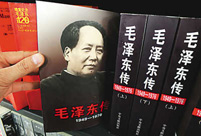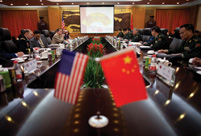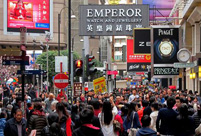 'Jin' named the word of the year by cross-strait netizens
'Jin' named the word of the year by cross-strait netizens Chinese scientific expedition goes to build new Antarctica station
Chinese scientific expedition goes to build new Antarctica station
 Chinese naval escort fleet conducts replenishment in Indian Ocean
Chinese naval escort fleet conducts replenishment in Indian Ocean 17th joint patrol of Mekong River to start
17th joint patrol of Mekong River to start China's moon rover, lander photograph each other
China's moon rover, lander photograph each other Teaming up against polluters
Teaming up against polluters
REVIVAL
When Mao was born in 1893, China was faced with internal and external troubles. A reform movement failed to save the Qing Dynasty (1644-1911) from being toppled. Sun Yat-sen, known as the Father of Modern China, also failed to avert internal conflicts.
After decades of struggles and endeavors, Mao and his comrades founded the People's Republic of China, which ended the oppression and aggression by foreign forces and achieved the independence and the liberation of the Chinese nation. A once-split China became a unified country of all parts except Taiwan.
In the following years, independent and relatively comprehensive industry and national economic systems, and the invention of satellites and nuclear and hydrogen bombs, helped boost national pride and confidence. Mao was regarded as China's biggest patriot and national hero in modern times.
Although Mao made severe mistakes in his late years, particularly during the Cultural Revolution, Mao Zedong Thought, which emphasizes seeking truth from facts, the "mass line" and independence, is still the long-term guiding principle for CPC governance.
Without the pros and cons of historical experience gained from practical exploration before reform and opening up, processes would not have proceeded so smoothly, Xi said.
Today the concept of economic construction has become the central work of the government, and the reform and opening up policy have taken root deep in people's hearts. Meanwhile, generations of CPC leaders have worked out a road to national rejuvenation -- a socialist road with Chinese characteristics.
Chairman Mao once summarized the national rejuvenation in two targets: state independence and national liberation, and a rich people and powerful nation.
China met the first target after more than 100 years of struggle, and the ruling CPC has pledged to achieve the second goal on the 100th anniversary of new China in 2049.
Xi proposed the "Chinese dream," a concept targeting "the great renewal of the Chinese nation," shortly after he took helm of the CPC in November last year. The Third Plenary Session of the 18th CPC Central Committee last month rolled out a reform blueprint for a richer and stronger China.
But the revival will not come easily.
At a museum in the suburbs of Chengdu in southwest China, historical materials show the extreme personality cult seen in the era of class struggle. They serve as reminders today of the importance of the pursuit of democracy and the rule of law and the maintenance of social stability.
"To realize the great rejuvenation of the Chinese nation, we must unswervingly advance reform and opening up," Xi told the symposium, stressing that the Third Plenary Session of the 18th CPC Central Committee launched wide-ranging reforms.
With reforms and efforts -- from the anti-graft and "mass line" campaigns, to campaigns for food safety and cleaner air -- the CPC is trying to tackle the obstacles on the road to rejuvenation.

 Commemorate 120th birth anniversary of Mao Zedong
Commemorate 120th birth anniversary of Mao Zedong Female soldiers of PLA Marine Corps in training
Female soldiers of PLA Marine Corps in training Chinese cities to have a very grey Christmas as smog persists
Chinese cities to have a very grey Christmas as smog persists China and U.S. - the national image in each other’s eyes
China and U.S. - the national image in each other’s eyes The Liaoning's combat capability tested in sea trial
The Liaoning's combat capability tested in sea trial Chinese pole dancing team show their moves in snow
Chinese pole dancing team show their moves in snow Rime scenery in Mount Huangshan
Rime scenery in Mount Huangshan Ronnie O'Sullivan: My children mean the world to me
Ronnie O'Sullivan: My children mean the world to me Shopping in Hong Kong: a different picture
Shopping in Hong Kong: a different picture SWAT conducts anti-terror raid drill
SWAT conducts anti-terror raid drill AK-47 inventor dies at 94
AK-47 inventor dies at 94 Mother practices Taiji with her son
Mother practices Taiji with her son  Crashed French helicopter salvaged
Crashed French helicopter salvaged Winter travels in Anhui
Winter travels in Anhui  Bird show opens to public in Calcutta, India
Bird show opens to public in Calcutta, IndiaDay|Week|Month